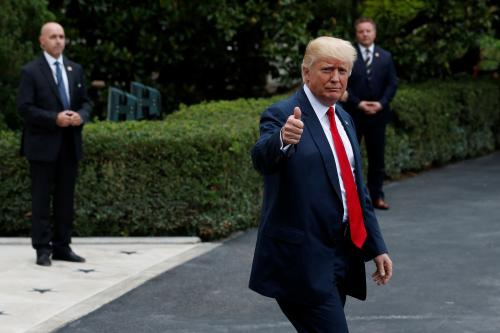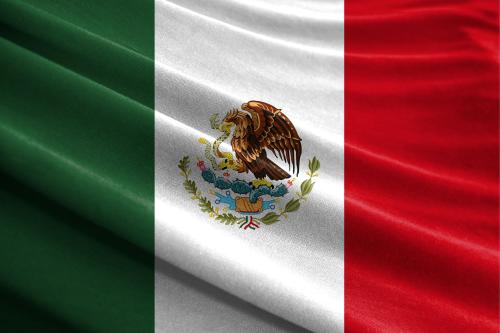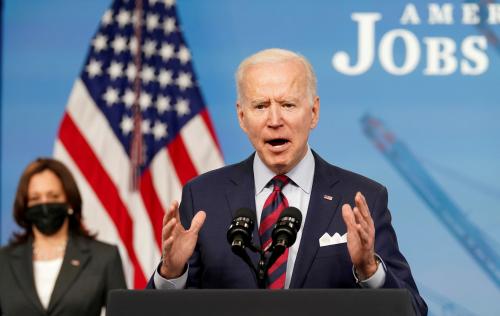This article originally appeared in the Australia Financial Review on March 5, 2018.
President Trump has promised to raise tariffs again. This is not an isolated threat but a continuation of a commitment he made during the election campaign to solve the US trade deficit. Before considering how countries might respond to these volleys of protectionism on solar panels, aluminum, steel and other products, it is instructive to go through the basic economics of what determines the trade position of a country.
The current account of a country is, by definition, the difference between a country’s national savings and national investment. A country that invests more than it saves has relative high interest rates and rates of return which drags financial capital from overseas. This capital inflow appreciates the currency and reduces export and raises imports. The trade deficit is the mirror of the capital inflow. Thus, the US current account deficit reflects the fact that the US government and private sector borrow to maintain investment and consumption. The composition of exports and imports reflect a range of issues such as comparative advantage, trade policies and other policies that distort trade but to the extent trade distortions don’t change the behavior of US consumers, firms and government they don’t change the trade balance. In other words, trade policies tends to change the composition of trade flows but not the overall trade balance.
This raises the issue of how aggrieved countries might respond to a tweeted threat of rising tariffs? In a recent paper Andy Stoeckel and I analyze a range of Trump Administration Policies including a trade war scenario. We show that a minor global trade war where tariffs rise 10 percent, would reduce GDP of most countries between 1 and 4.5 percent, with the US losing 1.3 percent of GDP and China 4.3 percent of GDP. A 40 percent change in tariffs would cause a deep global recession. The Smoot- Hawley tariff of 1930 comes to mind. It was driven by similar isolationists arguments that the Trump Administration now relies on.
As much as countries would like to raise tariffs in response to the uninformed aggression of the Trump Administration, this would clearly lead to losses for all and it would be yet another destruction of an important institution by the Trump Administration. This time it would be the WTO, which is the glue that binds the open world trading system.
As much as countries would like to raise tariffs in response to the uninformed aggression of the Trump Administration, this would clearly lead to losses for all and it would be yet another destruction of an important institution by the Trump Administration.
There is an alternative response for countries and it makes a lot more sense. A much smarter response which might even have unintended positive consequences for the world outside the US economy, is to consider again, the source of the US current account deficit. For decades trillions of dollars of global savings has been pouring into buying US treasury bills and other government securities. This effectively subsidizes the borrowing costs of the US government relative to what it would pay if it only had access to US domestic savings. It also drives down the cost of US corporations borrowing in domestic markets. This subsidy by foreigners to the US government has been made at the expense of investment that could have been made in any number of advanced and developing countries. This could have gone into infrastructure projects with much higher rates of return than offered by the US Treasury.
If the major creditor countries left their tariff rates unchanged and instead decided to sell their holdings of US government securities and invest in other countries, the US would quickly discover the fundamental error in the economic logic underpinning the Trump Administration. The US dollar would drop sharply, US long bonds would rise by several hundred basis points until US savings rose and US investment fell so as to move the trade position closer to balance. US exports would rise and imports would fall. US firms, consumers and the government would be far worse off due to higher borrowing costs but they would sell more for cheaper prices to foreigners!. The US would have to learn to live within its means if it no longer wanted to have the benefits of access to an open global trading system. The lesson would be that a country that leverages by borrowing for decades in order to sustain consumption and investment levels that are far removed from fundamentals, eventually has to pay. Is it not surprising that many of the billionaires in the Trump administration don’t understand this logic because the US economy has mirrored their own financial strategies of borrowing heavily, subsidized by foreigners and leveraging those loans to generate enormous wealth.
Of course, this would be a dramatic step, but it would not violate the principals of the WTO. It would enable market forces to lead to an adjustment in the US that has been needed for decades. It would also avoid the inevitable train wreck coming from future trillion dollar US fiscal deficits that will cause massive future increases in the US trade deficit. The US does not save on net, so therefore fiscal deficits have to be financed by foreigners implying rising trade deficits. On the plus side it might even provide emerging countries with needed financing depending on how the funding was allocated. This would be a much better outcome for these countries than a global trade war. It might even teach mercantilists of the world that their model of trade is actually wrong.
I doubt that any of this has escaped the leaders of the major countries who have advisers who have completed economics 101. I am just stating the obvious with a hope of avoiding a potential conflict.




Commentary
Op-edHow countries could respond to President Trump’s trade war
March 5, 2018